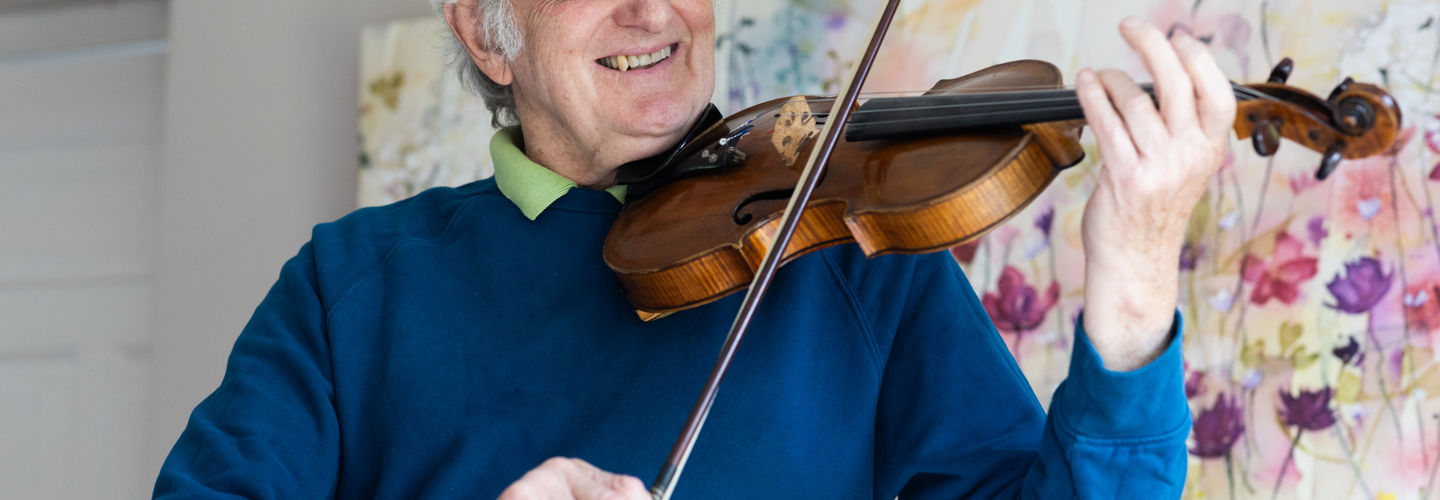
The Power of Music: How Music Therapy Supports Older Adults in Salisbury & Andover
Published: 04/08/2025
Music connects us in powerful and emotional ways. It can lift our spirits, trigger memories, reduce anxiety, and help us express emotions. For older adults — especially those living with dementia or receiving homecare — music offers proven therapeutic benefits for mind, body, and soul.
At Right at Home Salisbury & Andover, we witness firsthand how music enriches the lives of our Clients. Whether it’s a sing-along during a care visit or listening to a favourite tune at home, music is a simple, accessible tool that brings comfort and joy.
What Is Music Therapy?
Music therapy involves using music to address physical, emotional, or cognitive needs. It can be:
- Active - singing or playing instruments
- Passive - listening to music
While often guided by trained therapists, everyday care assistants and family members can easily include musical activities in daily routines to improve wellbeing.
5 Key Benefits of Music for Older Adults
1. Supports Emotional Expression and Mental Helath
Music helps older adults express complex emotions, especially for those with limited verbal communication. Research shows music can reduce anxiety and symptoms of depression, offering meaningful emotional release and resilience.1
2. Stimulates Memory and Cognitive Function
Familiar songs often unlock vivid memories. For those with dementia, music can support recognition, boost focus, and help maintain personal identity.2
3. Reduces Agitation and Promotes Calm
Soothing music can reduce behavioural symptoms such as restlessness or confusion, helping to create a more peaceful, reasuring environment for those with dementia.3
4. Builds Social Connection
Group music activities - like choirs, singalongs, or community music events in Salisbury & Andover, such as Golden-Oldies - create opportunities for laughter, connection and shared joy.4
5. Encourages Gentle Physical Movement
Even small actions like clapping or tapping to the rhythm can improve mobility, coordination, and balance - all while having fun.5
Easy Ways to Include Music in Daily Life
You don’t need to be a musician to benefit from music. Try these simple ideas:
- Play relaxing background music during mealtimes or rest
- Create personalised playlists of favourite songs
- Encourage singalongs during car rides or walks
- Use shakers, tambourines, or other easy-to-use instruments
- Join a local music group or dementia-friendly choir in Salisbury such as Alzheimer's Support, Salisbury Breathless Singers & New Sarum Singers
How Right at Home Salisbury & Andover Uses Music in Care
Our person-centred approach means we tailor visits to what brings Clients joy — and for many, that includes music. Our care assistants can:
- Play favourite songs during visits
- Support light musical activities or singing
- Share quiet listening time together
- Help Clients access music on smartphones or tablets
Music is often the bridge between comfort and connection. We make it part of our care because we know how much it matters.
Ready to Learn More?
If you or a loved one in Salisbury or Andover could benefit from compassionate companionship care that includes meaningful activities like music, we're here to help.
Call us today on 01722435615 or explore our companionship care services for more information.
References
1. Jäncke, L. (2008). Music, memory and emotion. J. Biol., 7(6):21. DOI: 10.1186/jbiol82
2. de Witte, M., Pinho. A.S., Stamd, G-J., Moonen, X., Bos, A.E.R., & van Hooren, S. (2020). Music therapy for stress reduction: A systematic review and meta-analysis. Health Psychol. Rev., 16(1): 134-159. DOI: 10.1080/17437199.2020.1846580
3. Liu, G., Hu, J., & Kostikova, I. (2025). Music therapy and its impact on anxiety and mental well-being of Chinese students: An experimental comparison of traditional and VR approaches. Acta Psychol., 255:104898. DOI: 10.1016/j.actpsy.2025.104898
4. Matziorinis, A.M. & Koelsch, S. (2022). The promise of music therapy for Alzheimer’s disease: A review. Ann. N Y Acad. Sci., 1516(1): 11-17. DOI: 10.1111/nyas.14864
5. De Nys, L., Oyebola, E.F., Connelly, J., Ryde, G.C., & Whittaker, A.C. (2024). Digital music and movement intervention to improve health and wellbeing in older adults in care homes: a pilot mixed methods study. BMC Geriatr., 24:733. DOI: 10.1186/s12877-024-05324-3
